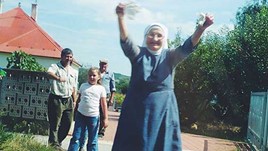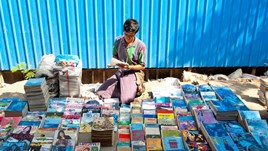
By Anne Cramer
Travel Writer7 Apr 2017 - 8 Minute Read
As a typical American, I’m made up of several different ethnicities – but I’ve always been drawn to, and identified most with, my Irish roots. One thing that’s always stirred something in my gut is traditional Irish music.
So, my first solo trip in 25 years of traveling was to Ireland. And by Ireland, I mean the whole country. I put 1,200 miles on my rental car in 10 days, just to experience it all.
Little did I know, I’d find a music lover’s paradise in a tiny town called Drumshanbo.



As soon as I arrived at my BnB in Carrick-on-Shannon, my lovely hostess, Dierdre, sat me down for tea like I was family. A niece who have come to visit after a long time away.
“What would you like to do while you’re here?” she asked.
“Music – any live music. Anywhere.”
Must be luck of the Irish. Just 8km away, the Joe Mooney Summer School festival of traditional music was in full swing.
Not only can I listen to as much music as I can stand, I can also take a class. I jumped at the opportunity and set off to register.
I’ve been a singer ever since I could produce breath, and what lay before me, for a mere 90 Euros, is a unique opportunity to combine my roots, my talent, and my love of foreign languages in one blissful setting.
I was the first to arrive at the classroom. The teacher promptly put me to work, helping her arrange the chairs into a giant circle. Little by little, people trickled in – all ages and, surprisingly to me, all ethnicities.
A fierce girl of 13 was asked to sing each song for us before we began learning it. Despite a shy outward appearance, she was lit from within when she sang – her voice rang through the place like a clear bell.
The first song was easy, and in English:
“What shall we do when we have no money?
All true lovers, what shall we do then?
Only hawk through the town for a hungry crown,
and we’ll yodel it over again!”
It spoke to the quintessentially Irish ability to take what life throws in their path, and just roll with it.
The next song was hauntingly beautiful. It’s about women in white dresses, dying the hems red as their men went off to war. It’s a typical Irish song that speaks to melancholy, a tragic past, suffering, and love.
Is go d-teidh tu, a mhurnin, slan!
Siubhail, siubhail, siubhail, a ruin!
Siubhail go socair, agus siubhail go ciuin,
Siubhail go d-ti an doras agus eulaigh liom,
Is go d-teidh tu, a mhurnin, slan !
And safe for aye may my darling be!
Come, come, come, O love!
Quietly come to me, softly move,
Come to the door, and away we'll flee,
And safe for aye may my darling be!
Everything about this song spoke to me. While the Irish surely suffered, they managed to create such beautiful music from their past. I too, like anyone, have suffered and experienced bouts of melancholy in my life. My usual therapy is to turn on some sad music and cry it out. But here, in the act of making music, I was not coming from a place of hopelessness, but one of strength and perseverance. I felt proud to claim my Irish ancestry more in this moment than any other.
I vowed to learn this song by heart and never forget it.
After the class, I thanked the teacher profusely. She suggested I stay in town for the remainder of the afternoon, and listen to all the amateur musicians who head to the pubs to play after the day’s lessons.



I didn’t need to be asked twice. I headed down to the pub and ordered a Smithwicks at the bar. Alas, the Irish genes did not go so far as to guarantee a love of Guinness.
I began to chat with an older gentleman sitting next to me, who told me his daughter lived in San Francisco. I couldn’t believe it: to go all the way to Ireland to meet a neighbor – there’s something very Irish about this.
We became fast friends and as the music wound down at the pub, he offered me to join his other daughter for dinner. I was welcomed again, as though I was long-lost family.
We headed down the street and sat down to dinner at a larger, but dimmer restaurant. Here we listened to musicians playing the fiddle, the flute, the concertina and most thrillingly, the bodhrán.
One of my classmates, a Spaniard, was also a bodhrán player and there he was, leading the group with drumming that stirred the soul. He recognized me, and I secretly hoped he would ask me to come up and sing, but alas, my 15 minutes of Irish fame was not meant to be.
As I left to drive back to Dierdre’s BnB, I marveled that I could find the one perfect day for me alone. Had I been traveling with a companion, sure, we might have had a drink and listened to some music, but it would be very unlikely that I would have had the immersive experience I had.
As I arrived back at the BnB, Dierdre wanted to hear all about it. I sang her the songs I learned, and she smiled and nodded, recognizing them. I also played a video of my San Francisco choir singing The Cloths of Heaven, based on the poem by that most Irish of poets, William Butler Yeats.
“I have spread my dreams under your feet;
Tread softly, because you tread on my dreams.”
Here, on my first solo travel adventure, I learnt that it’s ok to place yourself in vulnerable positions, to open yourself to meeting strangers, and to find yourself in the act of discovering your heritage. Dierdre, Drumshanbo, and my connection to the music of my ancestors made my trip to Ireland truly a dream come true.
Discover similar stories in
connection



No Comments